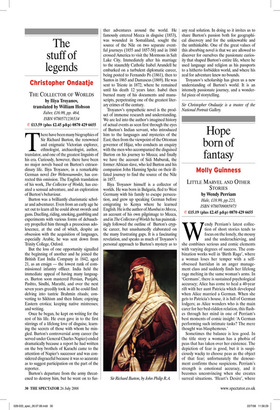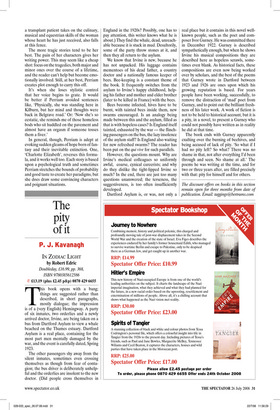Hope born of fantasy
Molly Guinness
LITTLE MARVEL AND OTHER STORIES by Wendy Perriam Hale, £18.99, pp.223, ISBN 9780709085973 0 £15.19 (plus £2.45 p&p) 0870 429 6655 Wendy Perriam’s latest collection of short stories tends to focus on the lonely, the mousy and the underachieving, and she combines serious and comic elements with varying degrees of success. The combination works well in ‘Birth Rage’, where a woman loses her temper with a selfobsessed harridan in an anger management class and suddenly finds her lifelong rage melting in the same woman’s arms. In ‘Germans’, there is sustained psychological accuracy; Alice has come to heal a 40-year rift with her aunt Patricia which developed when Alice married a German. When she gets to Patricia’s house, it is full of German lodgers; as Alice wonders who is the main carer for her bed-ridden relation, this flashes through her mind in one of Perriam’s best moments of comic insight: ‘A German performing such intimate tasks? The mere thought was blasphemous.’ Sometimes the balance is less good. In the title story a woman has a phobia of peas that has taken over her existence. The depiction of fear is good, but it is suspiciously wacky to choose peas as the object of that fear; unfortunately the denouement confirms these suspicions. Perriam’s strength is emotional accuracy, and it becomes unconvincing when she creates surreal situations. ‘Heart’s Desire’, where a transplant patient takes on the culinary, musical and equestrian skills of the woman whose heart he has just received, also falls at this fence.
The more tragic stories tend to be her best. The pain of her characters gives her writing power. This may seem like a cheap shot: focus on the tragedies, both major and minor ones over the course of a lifetime, and the reader can’t help but become emotionally involved. Still, at her best, Perriam creates plot enough to carry this off.
It’s when she loses stylistic control that her voice begins to grate. It would be better if Perriam avoided sentences like, ‘Physically, she was standing here in Kilburn, but her mind and thoughts were back in Belgrave road.’ Or: ‘Now she’s so ecstatic, she reminds me of those homeless bods who sit huddled on the pavement and almost have an orgasm if someone tosses them a fiver.’ In general, though, Perriam is adept at evoking sudden gleams of hope born of fantasy and their inevitable extinction. One, ‘Charlotte Elizabeth’, reverses this formula, and it works well too. Each story is based upon a psychological truth and sometimes Perriam stretches the bounds of probability and good taste to create her paradigms, but she does draw some convincing characters and poignant situations.



























































 Previous page
Previous page